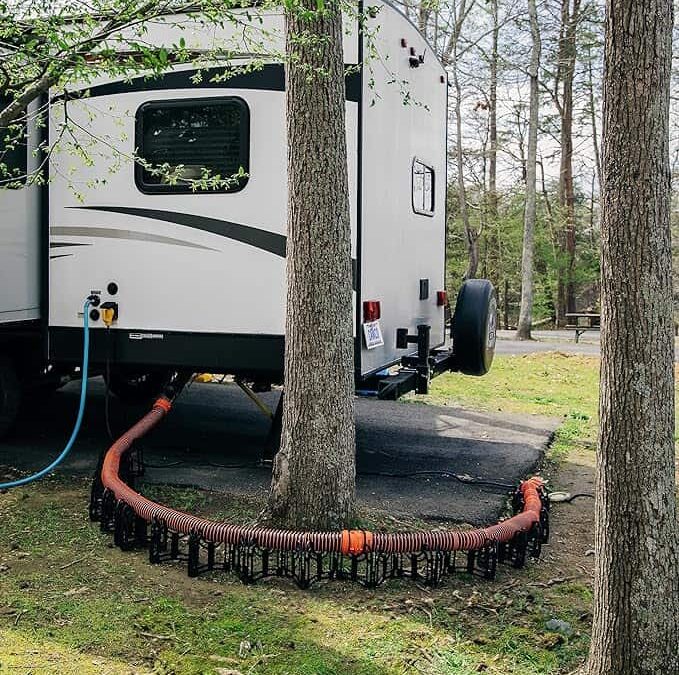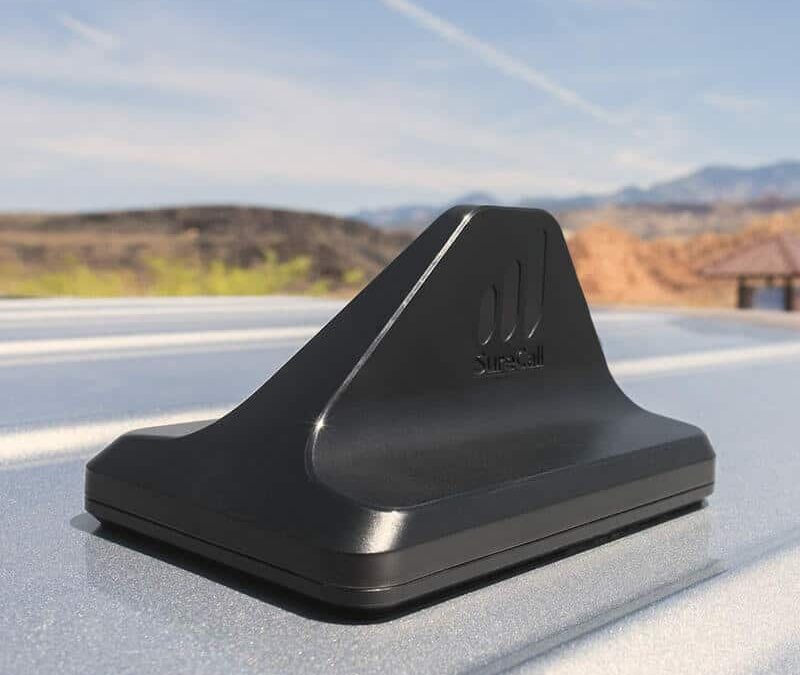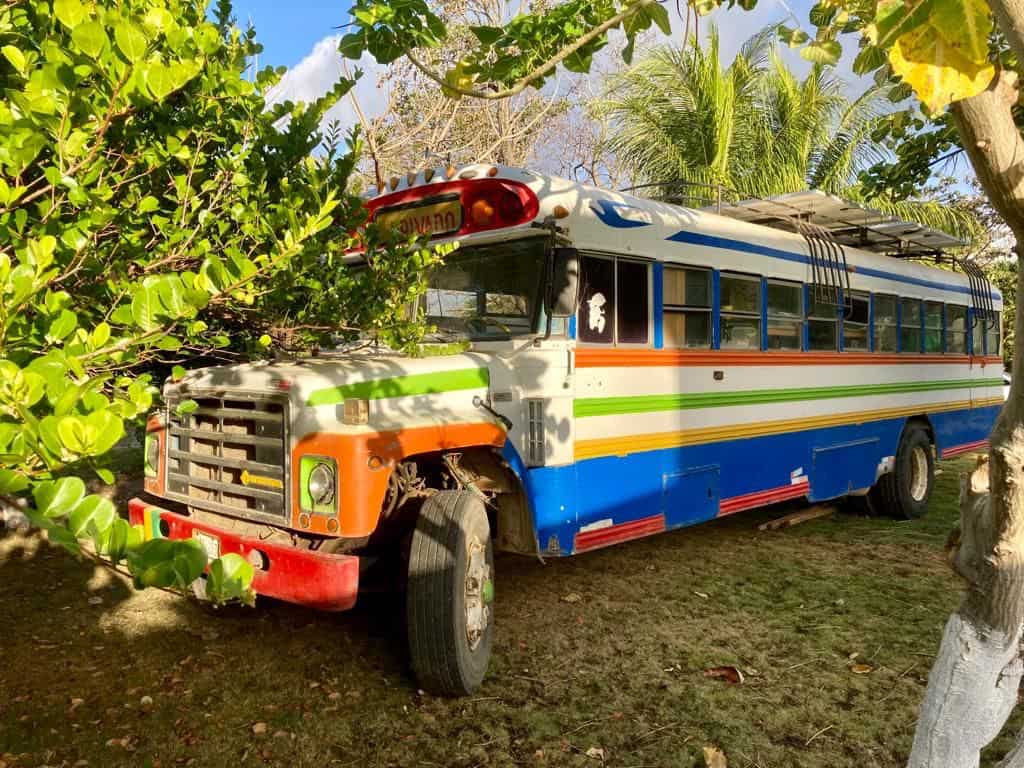
The skoolie of Josy and family: a Canadian school bus, used as a chicken bus in Nicaragua, and then converted into a skoolie.
If you are thinking about living on four wheels, then you may like to know if a skoolie (a bus conversion) is cheaper than an RV (recreational vehicle). In this article, we will explain to you if that is indeed the case, and why. We mention the cost of the home, the cost of maintenance, and the cost of travel.
We will also look into the pros and cons of both kinds of vehicles, so you have a general overview. Both a skoolie and an RV can be great ways to travel or to live in; it all depends on your personal preferences. Does that colourful bus make you want to pull funny faces and jump uncontrollably? Then a skoolie is the right choice for you. If you prefer a good old camper, then an RV might be your go-to.
Besides that we have added the interview with Josy, a mom who is living in a skoolie with her husband Bennie and their four children Lila, Teddy, Marley, and Bodhi. She also gives insight into the costs of their skoolie.
Costs of a skoolie
Cost of travel
Low. With a skoolie, you can stay at campsites and be on the grid, plugged in, or you can camp wherever you like and be off-grid. Not having to pay for a spot on a campsite of course drastically reduces costs.
Here you can watch a video about a family that travels in a skoolie for half a year, and in which all the costs are explained.
Cost of maintenance
Low. It will generally cost you $1000 – $5000 per year to maintain, inclusive of repairs to the engine. Most skoolie owners do a lot of maintenance by themselves: this saves a lot of money. And the parts of a skoolie are solid: they will last long. If you do not travel with your skoolie, then the cost of maintenance will be very low.
Cost of buying a skoolie
A skoolie costs about 10% of the sale price of a second-hand RV, according to www. popularmechanics.com. A school bus with about 150,000 miles on it will cost you at least $5.000 to $20.000. The cost of rebuilding a skoolie is relatively low: you can build your skoolie for anywhere between $10.000 and $35.000. Of course, it will take you a lot of time: this is not for everyone.
Here is an example of a couple that bought and converted a skoolie: in the video they break down all costs.
The pros and cons of a skoolie
Here is some general info about a skoolie; this might serve you while you are contemplating costs of a skoolie versus an RV.
Pros
- School buses are built to transport children and are very solid and heavy.
- Skoolies are safe: they were built to ensure safety at all times for the children being transported in them. They are built to withstand a collision for example, far more than a regular vehicle. They have to meet higher standards in this respect than regular vehicles.
- Offgrid possibilities: a skoolie is often custom built by the owner, and has more off-grid options than an RV.
- Can generally accommodate more people than an RV.
- You can customize it to your own needs and style.
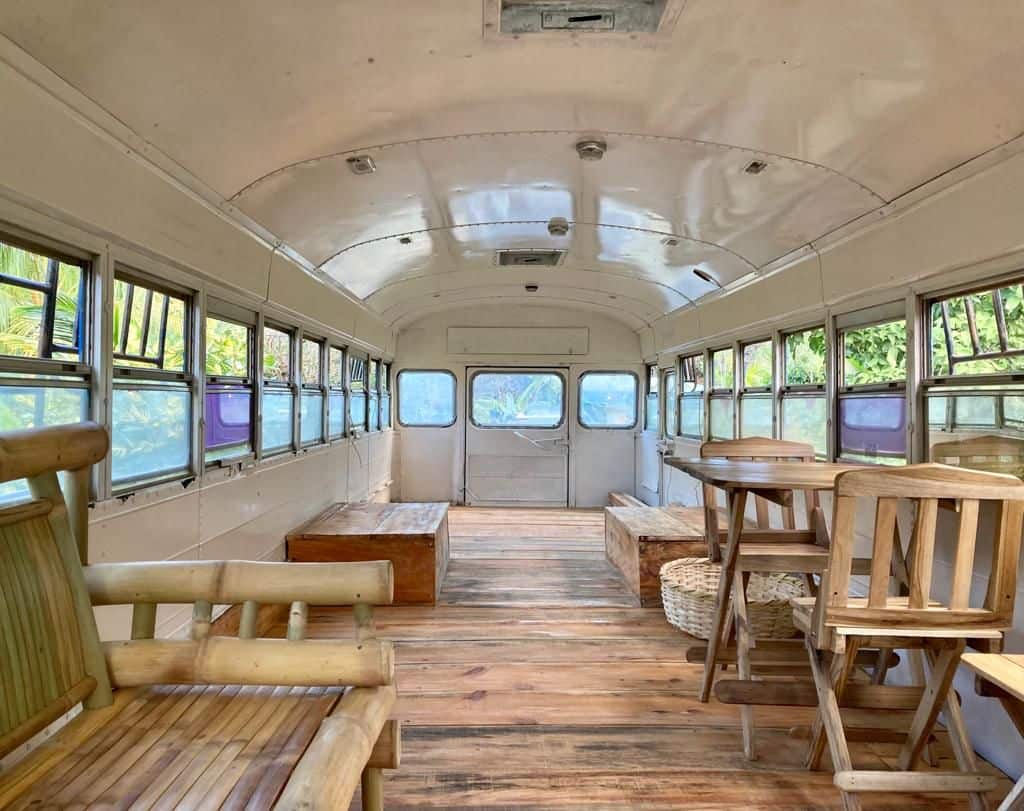
Interior of the skoolie of Josy and her family. Bennie, Josy’s husband, has made the interior. They are not driving with their skoolie, and live mostly outdoors. They are also minimalists: this is reflected in the interior: lots of space. You can also see how spacious a skoolie really is.
Cons
- The image of skoolie owners is sometimes still prejudiced. Sometimes skoolies are not allowed on campsites for example.
- Difficult to park due to its size.
- It may be difficult to rebuild it, it can take a lot of time. This depends on the amount of time that you have at your disposal for example. If you do not plan on traveling with the bus and have it parked permanently somewhere, converting it can be done fairly quickly. It also depends on the state the bus is in when you buy it; and when you buy the bus when it is empty, converting it can be done fairly quickly.
- It may be difficult to protect the skoolie from theft, but this is a problem all tiny houses face. Read here about ways to protect your tiny house.
- A skoolie is too large to use for transport into town, because of parking problems. You will need a smaller vehicle for that: a bicycle, a motorbike, or use public transport.
Costs of an RV
Cost of travel
You will need to go to campsites or find another place where you can plug in your RV since RVs are made to be on the grid. This will increase your costs of travel.
Cost of maintenance
Very generally speaking, the annual costs of maintenance for an average RV can be anywhere from $1500 to $8.000. It depends on the age of the RV, the state it was in when you bought it, the quality, and the way it is maintained. Also, the costs of maintenance can differ widely per year.
The cost of maintenance tends to be higher than a skoolie. This is because skoolie owners tend to be more DIY: they like to make repairs themselves if they can, and maintain their skoolie. And the skoolie is built in a very solid way; the skoolie just lasts longer, as do its parts.
Cost of buying an RV
You can buy a secondhand RV for as little as $15.000. But if you want a more upmarket kind of RV, it will be expensive. There are also different classes: A, B, and C. The bigger, newer, and more luxurious, the more expensive of course. You will easily pay somewhere between $50.000 and $200.000. The main advantage is: that you can just buy it and off you go, no DIY. For some people, this is a great advantage, and if you plan on living in it, it will still be way cheaper than owning or renting a home.
In this video you can learn about the costs of living in an RV. There may be costs that you have not thought of, better to be prepared.
The pros and cons of an RV
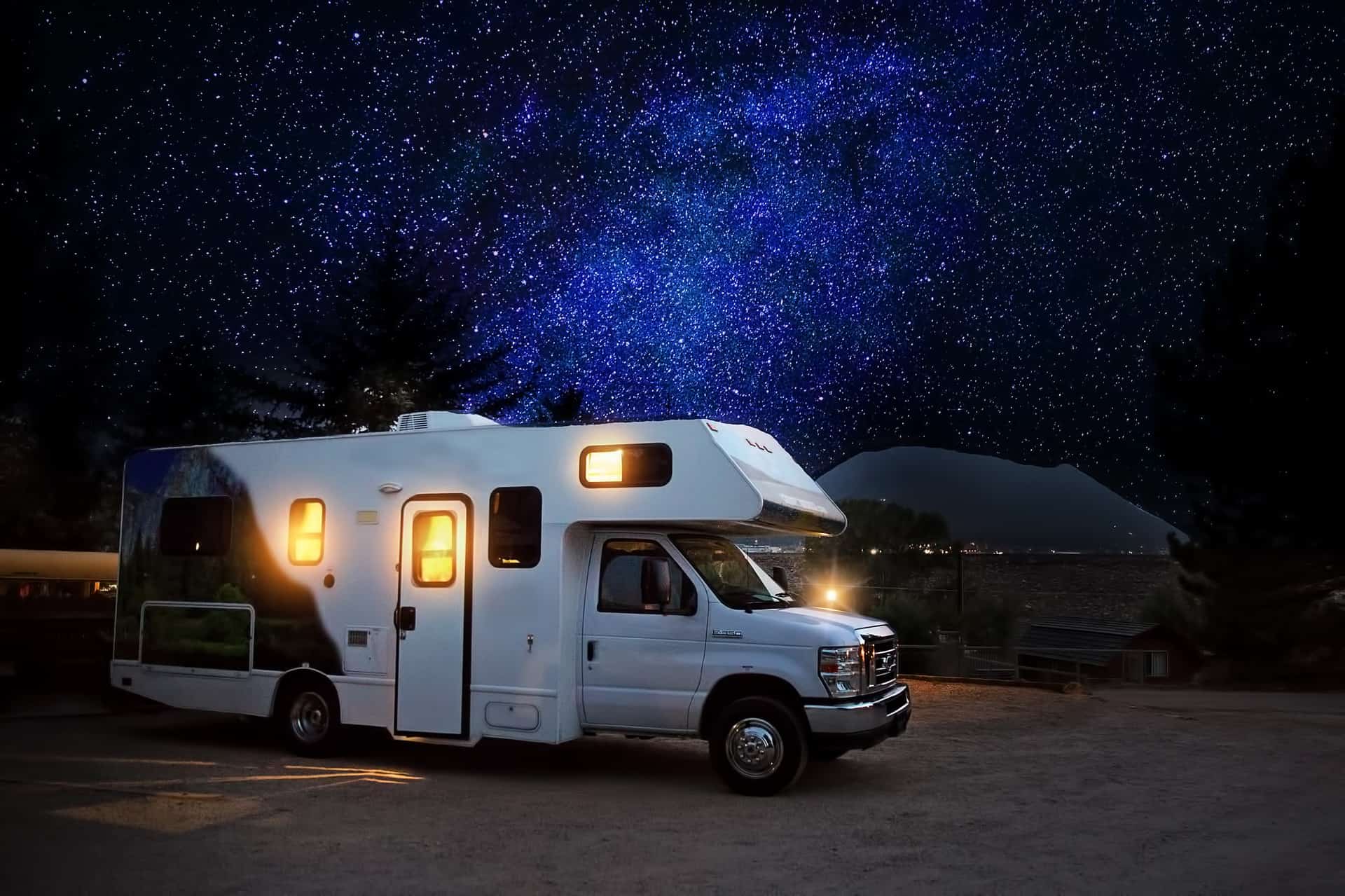
A recreational vehicle (an RV): easy to buy, relatively expensive, and comfortable.
Pros
- Relatively easy to park.
- Always accepted on campsites.
- Comfortable, modernized.
- RVs are usually readymade: this saves you the work of customizing it. If you are not good at working with your hands and/or have no time, then a readymade RV probably is the best option for you.
- You can get financing to buy and pay off your RV; this is not possible with a skoolie.
Cons
- RVs are made to travel from campsite to campsite, and not to use extensively for traveling or living in it full-time. This means that the quality of the vehicle can deteriorate quickly.
- Most RVs are unfortunately built cheaply and lightweight, and therefore not very durable. Take into account that within a few years, that fancy RV might not be so fancy anymore.
- They are made to provide a lot of comforts, but not to be safe and strong. They do not have to pass crash tests that a skoolie needs to do, in terms of safety.
- You will not have a lot of living space.
Below you can read the interview with Josy in her skoolie.
‘Dear Josy, are you living off the grid with your family in this wonderful skoolie?’
Josy: ‘We are. We wanted to be self-reliant, and to us, that means living off-grid, amongst other things. We also have planted over 1000 plants that are doing great because of the many hours of sun, the rainy season, and the fertile earth. We have solar panels, we have a gray water system, we filter the water from our well and we have a compost toilet. If the apocalypse comes: we will see it through (wink).’
We are curious to know how much this bus cost, and how much it cost to convert it.
Josy: ‘The bus itself cost $7.000,- to buy. The conversion of the bus, including a solar system, cost $10.000 in total.
‘Of course, everyone wants to know how a family of six can fit into a skoolie. Can you tell us about your experience?’
Josy: ‘Yes of course. Well, when we were still living in Berlin, we already embraced the minimalistic lifestyle. We do not need much; a few clothes, a few tools, some kitchen utensils, and a place to sleep. Here in Nicaragua life has become even more simple: one can live outdoors. Our skoolie is our shelter, that is all. We do not need shoes, we live barefoot, and we cook outdoors. We can have an outdoor bathroom and kitchen here. We are surrounded by nature, by plants, and we live with the elements. This to us is very fulfilling.
Our skoolie is our home but we live on our land. We do not travel with our skoolie, and we can therefore use the whole bus as our home and have more space.’
Was it difficult to customize the bus to your needs?
Josy: (smiles) ‘My husband Benny is a tiler, he learned the craft in Germany where we used to live. He is very good with his hands, and he had already converted two German fire trucks into RVs. He was able to convert it quickly. We love natural materials, and this is reflected in the interior.‘
‘Josy, can you tell us about this colorful bus and its rustic interior? What kind of bus is it, and how long did it take you to convert it?’
Josy: The bus is a former school bus from Canada and is used here in Nicaragua as a Tica bus, also known as a ‘chicken bus. When we bought the bus, it was already empty. My husband Bennie made everything himself and it took him two weeks to convert it. Materials are cheap here, even with inflation so it did not cost us much.’
‘What about safety, how do you protect your bus from thieves? Nicaragua is a very safe country, but theft can be a problem.’
Josy: ‘Yes. We do not have bars in front of our windows. But we have made a natural fence of fruit trees, we have guard dogs, and we will hire a ‘cuidador’, a caretaker. The cuidador is there to ensure that there is always someone on the property.’
We would like to thank Josy and her wonderful family for letting us peek inside their skoolie life. You can follow them on Instagram.

Josy, Bennie and their children Lila, Teddy, Marley and Bodhi.
Final thoughts
Let’s face it: building and using a skoolie is much more affordable and overall cheaper than buying and using the average RV. This is not to say that a skoolie suits everyone’s needs, not at all. Maybe you like to travel but do not want to build a skoolie yourself. Or maybe you prefer to have a modern vehicle: then an RV might be just what you need. And, not everyone is charmed by the idea of living or traveling in a bright yellow bus and attracting attention. Alright, school buses are not always yellow, but they sure stand out.
In this article, we discuss van life versus skoolie life. It is complementary to this article, and in it, you will find a lot of useful information. So you can read that if you want to know more about this subject.
Skoolie, or RV, whichever way it will be: we at Tiny Living Life wish you good luck with your journey, and we hope that you have enjoyed reading this article.

